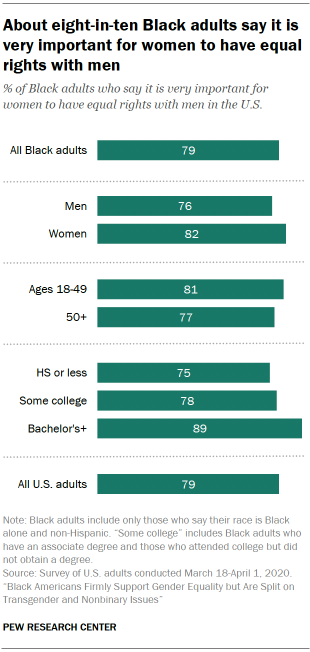
Black Americans are largely in support of gender equality between women and men and are critical of society’s lack of progress in the United States.
For many Black adults, their support of gender equality aligns with their spiritual or moral beliefs. Large majorities say opposing gender discrimination is essential to what those beliefs mean to them.
However, those who attend religious services at least a few times a year say their congregations often do not share their egalitarian views. Whereas Black adults think men and women should share financial responsibilities for their families equally, their congregations emphasize this role for men more than they do for women.
Findings in this chapter are drawn from two Pew Research Center surveys of U.S. adults conducted in 2019 and 2020.
Black adults differ by gender and education in their views on the progress of gender equality
The majority of Black adults say it is very important for women to have equal rights with men in the U.S. (79%), according to a Center survey conducted March 18 to April 1, 2020.2 Only 18% say it is somewhat important, while 3% say it is not too or not at all important.
Three-quarters or more of Black men (76%) and Black women (82%) say it very important for women to have equal rights with men, as do 81% of Black adults 18 to 49 and 77% of those 50 and older.
Black Americans’ views on gender equality vary by educational attainment. About nine-in-ten Black adults with a bachelor’s degree or higher level of education (89%) say that women having equal rights with men is very important. Though still a majority, Black adults with some college experience (78%) and those with a high school diploma or less (75%) are less likely to say this.
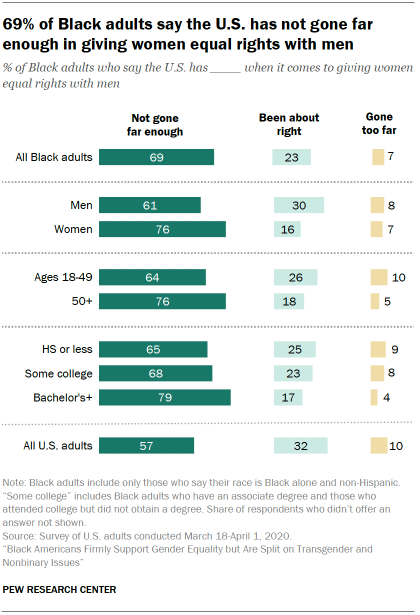
While most Black adults favor gender equality, they are also critical of the lack of progress toward it in the United States. About seven-in-ten Black adults (69%) say the U.S. has not gone far enough when it comes to giving women equal rights with men. Much smaller shares say the speed of this progress has been about right (23%) or has gone too far (7%). Black adults’ views on this question differ by gender, age and education.
About three-quarters of Black women (76%) and Black adults 50 and older (76%) say the U.S. has not gone far enough when it comes to gender equality, compared with 61% of Black men and 64% of Black adults under 50.
About eight-in-ten Black adults with a bachelor’s degree (79%) say the country has not gone far enough in giving women equal rights with men, as compared with 68% of Black adults with some college experience and 65% with a high school diploma or less.
Overall, Black adults (69%) are more likely than all U.S. adults (57%) to say the U.S. has not gone far enough when it comes to gender equality.
Among Black adults who say the U.S. has not gone far enough in giving women equal rights with men, three-quarters say it is at least somewhat likely that women in the U.S. will eventually have those rights (75%). However, only 24% say it is very likely, similar to the share that says it is not too or not at all likely (25%).
Black women who say the country has not gone far enough in giving women equal rights are more pessimistic about the prospect of achieving gender equality in the U.S. than Black men. About three-in-ten Black women say it is not too or not at all likely that women will eventually have equal rights with men (31%). Only 17% of Black men say the same.
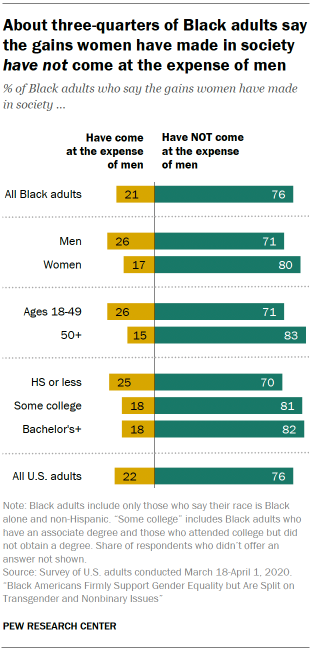
Black women and men not only differ in their views on the progress of gender equality in the country, they also differ on the costs. About a quarter of Black men say the gains women have made in society have come at the expense of men (26%). Smaller shares of Black women (17%) say the same. Still, most Black men (71%) say these gains have not come at the expense of men.
Although majorities of Black adults across age and education groups say the gains that women have made have not come at the expense of men, Black adults 50 and older and those with college experience (both with and without bachelor’s degrees) are the most likely to say this.
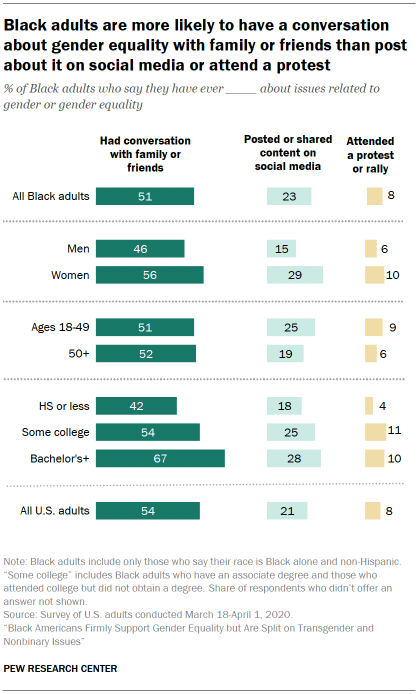
When it comes to sharing their views about gender and gender equality, Black adults are more likely to do so in conversations with family or friends (51%) than to post or share content on social networking sites (23%), contribute money to an organization working on gender issues (13%), contact a public official to express their opinion (9%) or attend a protest or rally (8%), according to the 2020 survey.
Some 56% of Black women say they have conversations about gender or gender equality with family and friends, and 46% of Black men say they do the same. Black women (29%) are more likely than Black men (15%) to post about gender issues on social media.
Black adults who have a bachelor’s degree (67%) are more likely than those with a high school diploma or less (42%) to have conversations about gender and gender equality with relatives and friends.
And Black adults ages 18 to 49 (51%) are about as likely as those 50 and older (52%) to have conversations about gender and gender equality with their family or friends.
Gender, faith and family
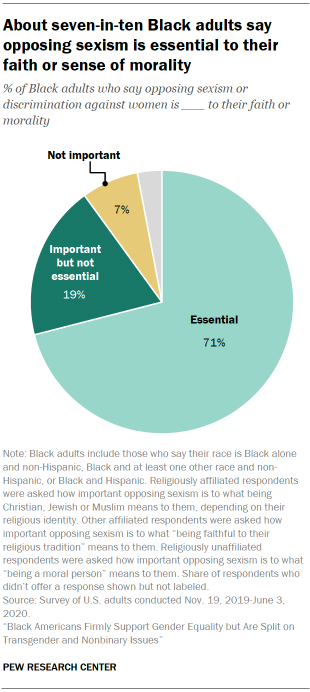
Many Black Americans see their views on gender equality as a core part of their religion or sense of morality, according to a Center survey of U.S. adults, with a large sample of Black adults, conducted Nov. 19, 2019, through June 3, 2020.3
Two-thirds of Black adults are Protestant Christians (66%), while others are Catholic (6%), members of other Christian faiths such as Jehovah’s Witnesses (3%), members of non-Christian faiths such as Islam (3%), or unaffiliated with a religion (21%).
About seven-in-ten Black adults, regardless of their religious affiliation, say opposing sexism or discrimination against women is essential to their faith or sense of morality (71%). Much smaller shares of Black adults say opposing sexism is important but not essential to their faith or sense of morality (19%) or not important at all (7%).
Roughly seven-in-ten Black adults across genders and age groups say opposing sexism is essential to their faith or sense of morality. However, Black adults with a high school diploma or less (64%) are less likely than those with a bachelor’s degree (76%) or those who have some college experience (73%) to say this.
Although the majority of Black adults say opposing sexism is essential to their faith or sense of morality, only about three-in-ten Black adults who attend religious services at least a few times a year (28%) say they heard a sermon on sexism in the year prior to the survey.4
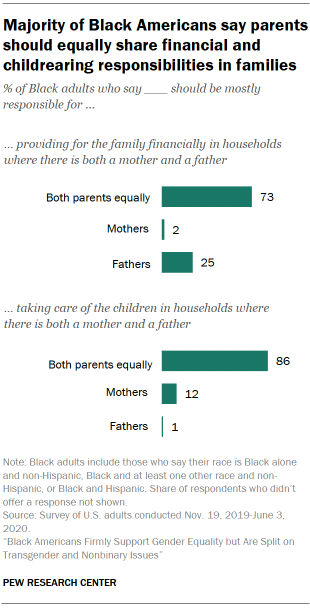
Black Americans’ broad acceptance of gender equality carries over to their views of gender roles in their families. The majority say mothers and fathers should be equally responsible for family finances in households where both are present (73%), while a quarter say that fathers should take the lead.
Black women (76%) are somewhat more likely than Black men (69%) to say mothers and fathers should share financial responsibilities equally. Though still a majority, Black adults ages 18 to 49 (75%) are slightly more likely to say this than those 50 and older (70%). And about three-quarters of Black adults across all education levels say that mothers and fathers should share family financial responsibilities equally.
An even larger majority of Black Americans believe that mothers and fathers should split child care responsibilities in households where both parents are present (86%). Most demographic subgroups of Black adults share this view, with few differences among them.
Although Black adults take these egalitarian stances on gender roles in their personal lives, many of them belong to congregations with different views. Roughly 60% of Black adults attend religious services at least annually. This includes 33% who attend weekly or more. And among those who attend annually, 60% go to houses of worship where the majority of the congregation and the clergy is Black – meaning that Black adults are hearing these gendered messages about Black families from Black religious leaders in predominantly Black religious spaces.
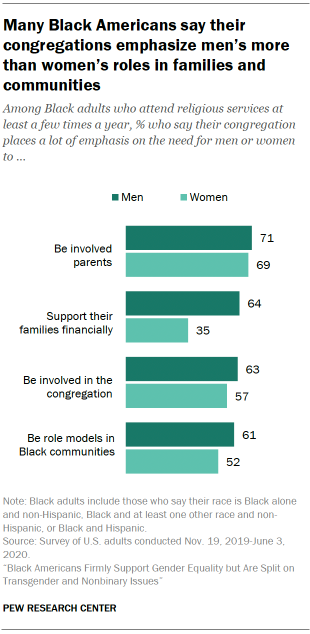
About seven-in-ten Black adults who attend religious services at least a few times a year say their congregations place a lot of emphasis on the need for both men (71%) and women (69%) to be involved parents.
But when it comes to being involved in congregations and being role models in Black communities, somewhat fewer hear these messages emphasized for women than men. For instance, 61% of Black congregants say their houses of worship strongly emphasize the need for men to be good role models, and 52% hear this emphasized for women.
There is an especially large gap on the issue of financial support within families: Only about a third of Black adults who attend religious services at least a few times a year (35%) say that their congregations stress that women should support their families financially, compared with 64% who say their congregations emphasize this for men.




